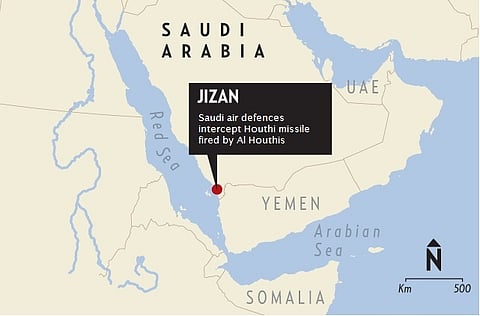Saudi Arabia downs Al Houthi missile over Jizan
Missile is latest in series of similar attacks by the Iran-backed militants

Riyadh: Saudi Arabia’s air defences on Friday intercepted a missile fired by Iran-backed Al Houthi militants, days after the insurgents’ second-in-command was killed in an air raid by Riyadh and its allies.
The missile, the latest in a series of similar attacks, was heading towards the kingdom’s southern coastal city of Jizan, state-run Al Ekhbariya television said.
n March, an Egyptian labourer became the first known fatality in an Al Houthi missile attack on Saudi Arabia.
Riyadh on Wednesday confirmed it was behind an air strike on the Yemeni capital that killed Saleh Al Sammad, president of the Al Houthi Supreme Political Council, on April 19.
The militants are to hold a public funeral for Al Sammad in Sana’a on Saturday.
The Saudi-led Arab coalition entered the Yemeni war in 2015 just months after an Al Houthi coup forced internationally-recognised Yemeni president Abd Rabbo Mansour Hadi out of power.
He later was able to escape house arrest and flee to Aden where he temporarily shifted government headquarters.
Since then, the coalition has gained back 86 per cent of Yemeni territory but major population centres still remain under Al Houthi control.
Saudi Arabia and the US have accused Iran of illegally smuggling weapons into Yemen to sustain Al Houthi war efforts.
In December, one such Iranian-made ballistic missile was fired towards Riyadh for the first time in the three-year war.
Although it was intercepted, Riyadh called it an ‘act of war’.
The war has cost the lives of thousands of Yemenis and pushed the Arab world’s poorest country to the brink of famine.
The latest government push seeks to take advantage of cracks in the awkward Al Houthi alliance with former Yemeni President Ali Abdullah Saleh’s supporters.
Saleh ruled Yemen for more than three decades until he was forced to resign following an Arab Spring uprising in 2011.
He remained in the country, however, and continued to wield power from behind the scenes.
In 2014, his forces allied with Al Houthi militia, despite the fact that as president he had gone to war with them.
There had been simmering tensions between the two awkward allies in past months that boiled over in December when Saleh suggested he would cooperate with Hadi — he was assassinated shortly after.
Since then senior members of Saleh’s party have either been executed or placed under house arrest by Al Houthis amid a draconion crackdown.
The broken alliance between Al Houthis and forces loyal to Saleh appears to be permanent, which will help the Yemeni government and its backers in the Saudi-led coalition weaken their grip on the country given the reduction in manpower.
In a recent meeting with New York Times editors, Saudi Crown Prince Mohammad Bin Salman said that Al Houthis have become increasingly isolated politically.
He dismissed the seven missiles Al Houthis fired at Saudi Arabia from Yemen on March 25 as “a last-ditch effort” that only showed they were weak.
Saudi Arabia, he said, is now seeking to end the war through a political process, trying to divide Al Houthis and maintaining military pressure on them.
Sign up for the Daily Briefing
Get the latest news and updates straight to your inbox



